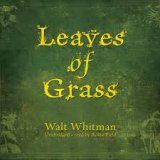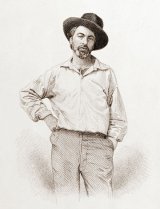Leaves of Grass Page #9
Leaves of Grass is a poetry collection by the American poet Walt Whitman (1819–1892). Although the first edition was published in 1855, Whitman spent most of his professional life writing and re-writing Leaves of Grass, revising it multiple times until his death. This resulted in vastly different editions over four decades—the first, a small book of twelve poems and the last, a compilation of over 400.
flies swiftly over the note-book, the sign-painter is lettering with blue and gold, The canal boy trots on the tow-path, the book-keeper counts at his desk, the shoemaker waxes his thread, The conductor beats time for the band and all the performers follow him, The child is baptized, the convert is making his first professions, The regatta is spread on the bay, the race is begun, (how the white sails sparkle!) The drover watching his drove sings out to them that would stray, The pedler sweats with his pack on his back, (the purchaser higgling about the odd cent;) The bride unrumples her white dress, the minute-hand of the clock moves slowly, The opium-eater reclines with rigid head and just-open'd lips, The prostitute draggles her shawl, her bonnet bobs on her tipsy and pimpled neck, The crowd laugh at her blackguard oaths, the men jeer and wink to each other, (Miserable! I do not laugh at your oaths nor jeer you;) The President holding a cabinet council is surrounded by the great Secretaries, On the piazza walk three matrons stately and friendly with twined arms, The crew of the fish-smack pack repeated layers of halibut in the hold, The Missourian crosses the plains toting his wares and his cattle, As the fare-collector goes through the train he gives notice by the jingling of loose change, The floor-men are laying the floor, the tinners are tinning the roof, the masons are calling for mortar, In single file each shouldering his hod pass onward the laborers; Seasons pursuing each other the indescribable crowd is gather'd, it is the fourth of Seventh-month, (what salutes of cannon and small arms!) Seasons pursuing each other the plougher ploughs, the mower mows, and the winter-grain falls in the ground; Off on the lakes the pike-fisher watches and waits by the hole in the frozen surface, The stumps stand thick round the clearing, the squatter strikes deep with his axe, Flatboatmen make fast towards dusk near the cotton-wood or pecan-trees, Coon-seekers go through the regions of the Red river or through those drain'd by the Tennessee, or through those of the Arkansas, Torches shine in the dark that hangs on the Chattahooche or Altamahaw, Patriarchs sit at supper with sons and grandsons and great-grandsons around them, In walls of adobie, in canvas tents, rest hunters and trappers after their day's sport, The city sleeps and the country sleeps, The living sleep for their time, the dead sleep for their time, The old husband sleeps by his wife and the young husband sleeps by his wife; And these tend inward to me, and I tend outward to them, And such as it is to be of these more or less I am, And of these one and all I weave the song of myself. 16 I am of old and young, of the foolish as much as the wise, Regardless of others, ever regardful of others, Maternal as well as paternal, a child as well as a man, Stuff'd with the stuff that is coarse and stuff'd with the stuff that is fine, One of the Nation of many nations, the smallest the same and the largest the same, A Southerner soon as a Northerner, a planter nonchalant and hospitable down by the Oconee I live, A Yankee bound my own way ready for trade, my joints the limberest joints on earth and the sternest joints on earth, A Kentuckian walking the vale of the Elkhorn in my deer-skin leggings, a Louisianian or Georgian, A boatman over lakes or bays or along coasts, a Hoosier, Badger, Buckeye; At home on Kanadian snow-shoes or up in the bush, or with fishermen off Newfoundland, At home in the fleet of ice-boats, sailing with the rest and tacking, At home on the hills of Vermont or in the woods of Maine, or the Texan ranch, Comrade of Californians, comrade of free North-Westerners, (loving their big proportions,) Comrade of raftsmen and coalmen, comrade of all who shake hands and welcome to drink and meat, A learner with the simplest, a teacher of the thoughtfullest, A novice beginning yet experient of myriads of seasons, Of every hue and caste am I, of every rank and religion, A farmer, mechanic, artist, gentleman, sailor, quaker, Prisoner, fancy-man, rowdy, lawyer, physician, priest. I resist any thing better than my own diversity, Breathe the air but leave plenty after me, And am not stuck up, and am in my place. (The moth and the fish-eggs are in their place, The bright suns I see and the dark suns I cannot see are in their place, The palpable is in its place and the impalpable is in its place.) 17 These are really the thoughts of all men in all ages and lands, they are not original with me, If they are not yours as much as mine they are nothing, or next to nothing, If they are not the riddle and the untying of the riddle they are nothing, If they are not just as close as they are distant they are nothing. This is the grass that grows wherever the land is and the water is, This the common air that bathes the globe. 18 With music strong I come, with my cornets and my drums, I play not marches for accepted victors only, I play marches for conquer'd and slain persons. Have you heard that it was good to gain the day? I also say it is good to fall, battles are lost in the same spirit in which they are won. I beat and pound for the dead, I blow through my embouchures my loudest and gayest for them. Vivas to those who have fail'd! And to those whose war-vessels sank in the sea! And to those themselves who sank in the sea! And to all generals that lost engagements, and all overcome heroes! And the numberless unknown heroes equal to the greatest heroes known! 19 This is the meal equally set, this the meat for natural hunger, It is for the wicked just same as the righteous, I make appointments with all, I will not have a single person slighted or left away, The kept-woman, sponger, thief, are hereby invited, The heavy-lipp'd slave is invited, the venerealee is invited; There shall be no difference between them and the rest. This is the press of a bashful hand, this the float and odor of hair, This the touch of my lips to yours, this the murmur of yearning, This the far-off depth and height reflecting my own face, This the thoughtful merge of myself, and the outlet again. Do you guess I have some intricate purpose? Well I have, for the Fourth-month showers have, and the mica on the side of a rock has. Do you take it I would astonish? Does the daylight astonish? does the early redstart twittering through the woods? Do I astonish more than they? This hour I tell things in confidence, I might not tell everybody, but I will tell you. 20 Who goes there? hankering, gross, mystical, nude;
Translation
Translate and read this book in other languages:
Select another language:
- - Select -
- 简体中文 (Chinese - Simplified)
- 繁體中文 (Chinese - Traditional)
- Español (Spanish)
- Esperanto (Esperanto)
- 日本語 (Japanese)
- Português (Portuguese)
- Deutsch (German)
- العربية (Arabic)
- Français (French)
- Русский (Russian)
- ಕನ್ನಡ (Kannada)
- 한국어 (Korean)
- עברית (Hebrew)
- Gaeilge (Irish)
- Українська (Ukrainian)
- اردو (Urdu)
- Magyar (Hungarian)
- मानक हिन्दी (Hindi)
- Indonesia (Indonesian)
- Italiano (Italian)
- தமிழ் (Tamil)
- Türkçe (Turkish)
- తెలుగు (Telugu)
- ภาษาไทย (Thai)
- Tiếng Việt (Vietnamese)
- Čeština (Czech)
- Polski (Polish)
- Bahasa Indonesia (Indonesian)
- Românește (Romanian)
- Nederlands (Dutch)
- Ελληνικά (Greek)
- Latinum (Latin)
- Svenska (Swedish)
- Dansk (Danish)
- Suomi (Finnish)
- فارسی (Persian)
- ייִדיש (Yiddish)
- հայերեն (Armenian)
- Norsk (Norwegian)
- English (English)
Citation
Use the citation below to add this book to your bibliography:
Style:MLAChicagoAPA
"Leaves of Grass Books." Literature.com. STANDS4 LLC, 2024. Web. 23 Dec. 2024. <https://www.literature.com/book/leaves_of_grass_23>.




Discuss this Leaves of Grass book with the community:
Report Comment
We're doing our best to make sure our content is useful, accurate and safe.
If by any chance you spot an inappropriate comment while navigating through our website please use this form to let us know, and we'll take care of it shortly.
Attachment
You need to be logged in to favorite.
Log In